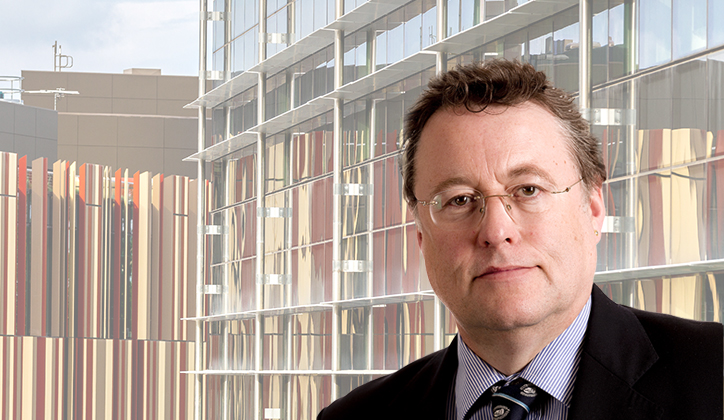Join us in congratulating Professor John Simons – already a familiar face around campus in his current role as Executive Dean, Faculty of Arts – on his appointment to the role of Deputy Vice-Chancellor (Academic).
We asked Professor Simons a number of questions about his academic background, aspirations for the new role and the challenges that lie ahead.
What’s the layman’s version of your academic background and expertise?
I studied classics at school and medieval Celtic and Germanic languages at university where I earned a PhD in medieval English literature. My current research (and most recent four books) is on the history of human/animal relations and the cultural construction of animals. I’ve written or edited 17 books to date (with one currently in progress and two out for consideration with publishers) on a very wide range of topics.
How did you come to be in Australia and then at Macquarie?
I didn’t have a plan to come to Australia. I was picked up by an international search firm and as I knew Macquarie to be one of the best Australian universities I was only too pleased to come here. My most recent book at that time was about Australian animals in Victorian England so I had lived in Australia imaginatively for a couple of years already. I have not regretted my choice to come to Macquarie (and Australia) for a second and intend to become a citizen next year.
What do you hope to achieve in the new role?
What I’d like to achieve in the new role is to firstly build on the very positive collegiate culture here to give academic staff real ownership of the processes of curriculum development, delivery and quality assurance and to establish a healthy and long-term sustainable relationship between the executive and deliberative arms of the university.
I’d like to find ways of hearing the student voice more clearly. I also hope that we will continue to move forward in making Macquarie renowned for the innovation in its learning and teaching, its attention to the student experience and its capacity to exploit excellence in research in the classroom.
Finally, I want to get a really strategic connection between developments in teaching and learning and the procurement and deployment of learning resources. Having the PVC L&T and the University Librarian in my team places me well to do that.
What are the challenges that lie ahead?
All universities face the same challenges: employability of their graduates; the digital revolution; globalisation. I am already heading an executive level project on employability and we are trying to put together some really innovative approaches to employability which go beyond conventional ‘work-related learning’ and add real value to the student experience. A wonderful example of this is the way in which PACE can be packaged as an experience which sets our students apart in the employment market.
Globalisation is a challenge because I believe that capacity building in Asia will eventually affect not only our international market but also our domestic intake as students move towards high quality low cost English-speaking courses in other countries. In some ways we can address this via the digital revolution and create different ways of accessing our programs both at home and abroad.
I am already working on a project to develop an online Macquarie degree to be priced at a level of affordability that makes it accessible in the less developed world and this will I hope create the kind of global footprint that will sustain us in international competition.
My philosophy (and it has worked to date) is that the key is to understand that success is not about how many students you recruit but how many you reach. Generally we need to embrace the digital revolution and invest in building high quality artefacts to replace some of our conventional teaching and in the development of new skills in academic staff.
What do you see for the future at Macquarie?
The smart universities of the next decade will be those which optimise the collaborative potential between their faculties to build new curriculum; which understand that digital versus face-to-face is both/and not either/or; that the real and virtual campuses are merely different articulations of a single space; which really live the value that everyone from the first year undergraduate to the VC are equal members of the College; which are prepared to make bold decisions and, if necessary, cannibalise their own market in order to thrive; which are as much about being as doing.
There is no reason why we can’t do and be all these things. We are a university of service and engagement driven by core academic principles: there can be few better starting points for a journey into a necessarily uncertain future.

